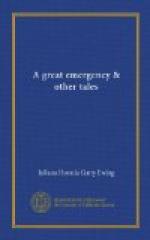Henrietta was very good at inventing things. Once she invented a charade quite like a story. Rupert was very much pleased with it, because he was to act the hero, who was to be a young cavalier of a very old family—our family. He was to arrive at an inn; Henrietta made it the real old inn in the middle of the town, and I was the innkeeper, with Henrietta’s pillow to make me fat, and one of Nurse’s clean aprons. Then he was to ask to spend a night in the old Castle, and Henrietta made that the real Castle, which was about nine miles off, and which belonged to our cousin, though he never spoke to us. And a ghost was to appear. The ghost of the ancestor in the miniature in Mother’s bedroom. Henrietta did the ghost in a white sheet; and with her hair combed, and burnt-cork moustache, she looked so exactly like the picture that Rupert started when she came in, and stared; and Mother said he had acted splendidly.
Henrietta was wonderfully like the picture. Much more like than Rupert ever was, which rather vexed him, because that ancestor was one of the very bravest, and his name was Rupert. He was rather vexed, too, when she rode the pony bare-backed which had kicked him off. But I think the pony was fonder of Henrietta, which perhaps made it easier for her to manage it. She used to feed it with bits of bread. It got them out of her pocket.
One of the things Henrietta could not do as well as Rupert was cricket. Rupert was one of the best players in the school. Henrietta used to want to play with us at home, and she and I did play for a bit, before breakfast, in the drying ground; but Rupert said, if I encouraged her in being unladylike, he would not let me come to the school matches. He said I might take my choice, and play either with girls or boys, but not with both. But I thought it would be very mean to leave Henrietta in the lurch. So I told her I would stick by her, as Rupert had not actually forbidden me. He had given me my choice, and he always kept his word. But she would not let me. She pretended that she did not mind; but I know she did, for I could see afterwards that she had been crying. However, she would not play, and Mother said she had much rather she did not, as she was so afraid of her getting hit by the ball. So that settled it, and I was very glad not to have to give up going to the school matches.
The school we went to was the old town grammar school. It was a very famous one; but it was not so expensive as big public schools are, and I believe this was why we lived in this town after my father’s death, for Mother was not at all rich.
The grammar school was very large, and there were all sorts of boys there—some of gentlemen, and tradesmen, and farmers. Some of the boys were so very dirty, and had such horrid habits out of school, that when Rupert was thirteen, and I was ten, he called a council at the beginning of the half, and a lot of the boys formed a committee, and drew up the code of honour, and we all subscribed to it.




